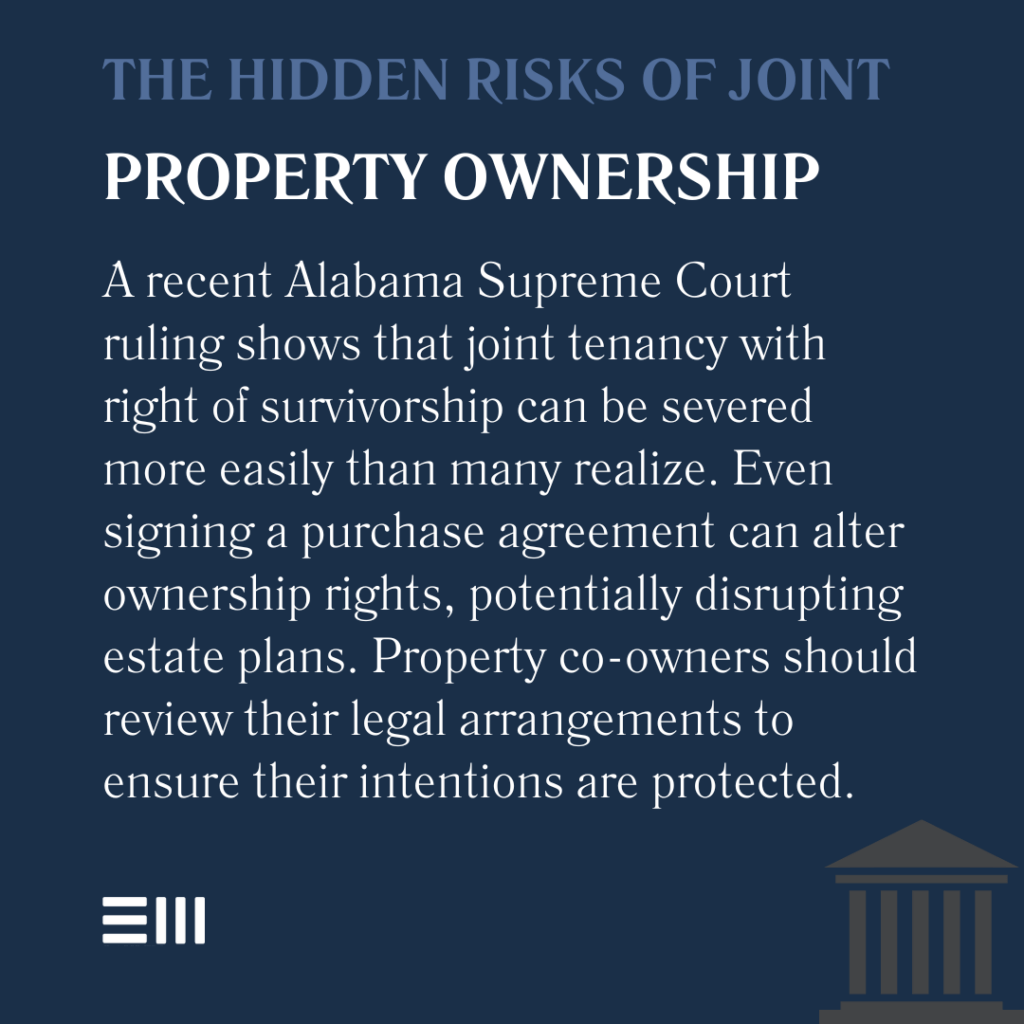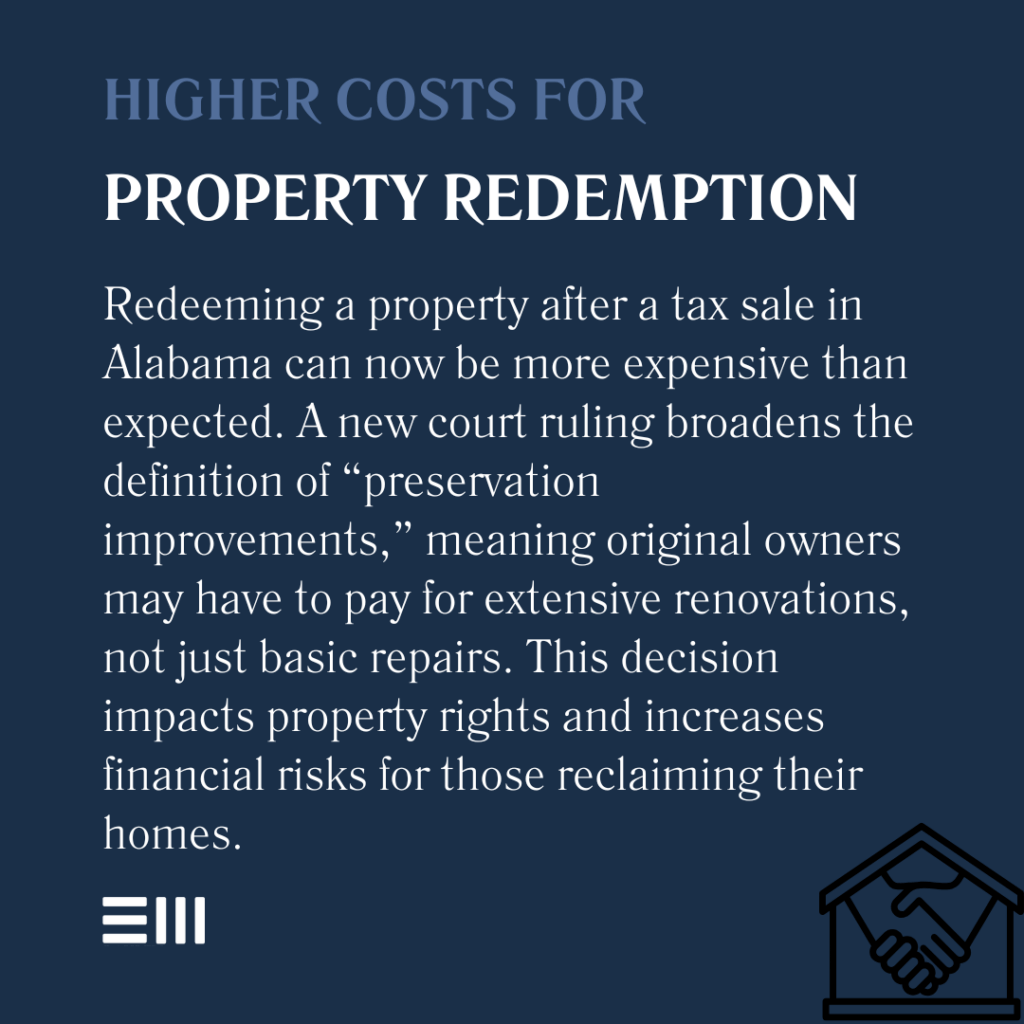
Recent court decisions have dramatically altered the landscape of property law in Alabama, affecting everything from joint property ownership to tax sale redemptions.
These changes could significantly impact your rights as a property owner, your estate planning strategy, and even how you navigate real estate transactions.
Home Equity Protection: A Constitutional Victory
In a landmark decision that has implications for Alabama property owners, the Supreme Court of the United States ruled against government “home equity theft” in Tyler v. Hennepin County, Minnesota.
The case involved a 94-year-old woman whose apartment was seized after she fell behind on property taxes. The government not only took her property but kept $25,000 in surplus equity beyond what she owed.
The Supreme Court unanimously ruled this practice violated the Fifth Amendment’s Takings Clause, with Chief Justice Roberts noting, “the taxpayer must render unto Caesar what is Caesar’s, but no more.”
While this case specifically addressed Minnesota law, it creates important precedent that could affect Alabama’s approach to tax sales. Currently, Alabama law allows property owners to recover surplus funds if they redeem the property within three years of a tax sale. After that period, any surplus goes to the county’s general fund.
This ruling suggests Alabama’s statute could face constitutional challenges in the future. Property owners who have lost equity in tax sales should be aware that the legal landscape is shifting in their favor.
Joint Property Ownership: A Critical Warning for Co-Owners
The Alabama Supreme Court’s decision in Upchurch v. Upchurch delivers a critical warning to anyone who owns property in joint tenancy with right of survivorship—a common arrangement between spouses, siblings, and business partners.
In this case, three family members owned property as joint tenants with right of survivorship. They signed a purchase agreement to sell the property, but before closing, one owner passed away.
The court ruled that the mere signing of the purchase agreement converted their joint tenancy into a tenancy in common, meaning the deceased owner’s share passed to his estate rather than automatically transferring to the surviving owners.
This decision underscores a vital point: even preliminary agreements about property can fundamentally alter ownership rights in Alabama. The implications for estate planning are significant.
This ruling reinforces that joint tenancy with right of survivorship can be severed more easily than many realize. Anyone with jointly held property should review their estate plans immediately to ensure their intentions will be honored.

Property Redemption Costs: “Preservation Improvements” Redefined
In another significant decision, the Alabama Supreme Court has expanded the definition of “preservation improvements” in property redemption cases. In Ex Parte King III, the court addressed a situation where a fire-damaged, uninhabitable home was purchased at a tax sale and extensively renovated.
When the original owner sought to redeem the property, he argued he should only have to pay for repairs that prevented further deterioration—not the nearly $89,000 invested to make the home livable again. The court disagreed, ruling that “preservation improvements” include “valuable and useful additions and improvements to the property…including improvements beyond those necessary to merely prevent further deterioration.”
This expanded definition significantly increases the potential cost of redeeming property after a tax sale if substantial improvements have been made.
The court’s interpretation aims to address urban blight and maximize property use. However, it also means property owners seeking redemption may face much higher costs than anticipated if the new owner has made significant improvements.

Legal Disputes and Property Sales: Understanding Lis Pendens
For property owners involved in legal disputes, the Alabama Supreme Court’s ruling in Ex parte MUSA Properties, LLC provides important guidance on lis pendens notices—legal filings that alert potential buyers to ongoing litigation affecting a property.
The court ruled that a lis pendens notice should remain in place until all aspects of the case are resolved, including appeals. This decision protects buyers from unknowingly purchasing property with legal complications and ensures sellers cannot prematurely remove these notices.
This ruling reinforces the importance of thorough title searches when purchasing property. It also means that property owners in legal disputes should be prepared for potential delays in selling their property until all litigation is completely resolved.
Environmental Regulations: Clean Water Act Narrowed
In a decision affecting landowners near bodies of water, the Supreme Court narrowed the interpretation of the Clean Water Act in Sackett v. EPA. The Court rejected the previously broad “significant nexus test” for determining when a wetland falls under federal protection.
Instead, wetlands must now have a “continuous surface connection” with protected waters, making it “difficult to determine where the ‘water’ ends and the ‘wetland’ begins.” This significantly reduces the EPA’s regulatory authority over certain properties.
While this federal decision is not specific to Alabama, it has meaningful implications for Alabama property owners, particularly those with land near wetlands, streams, or lakes.
This narrower interpretation gives Alabama property owners more freedom to develop land that was previously subject to federal oversight. However, state and local regulations may still apply, so consulting with knowledgeable legal counsel remains essential before proceeding with development near water features.
What These Changes Mean for Alabama Property Owners
These court decisions collectively represent a significant shift in property rights, ownership structures, and redemption processes in Alabama. For property owners, the implications are far-reaching:
- Estate Planning Impact: Joint property ownership arrangements should be carefully reviewed to ensure they align with your intentions, as they may be more easily severed than previously understood.
- Tax Sale Protection: Property owners have stronger constitutional protections against government taking of equity, though Alabama’s current three-year redemption window remains in effect.
- Redemption Costs: The cost to redeem property after a tax sale may be substantially higher if the new owner has made significant improvements.
- Property Disputes: Legal disputes involving property may take longer to resolve, with lis pendens notices remaining in effect throughout the entire legal process.
- Environmental Regulations: Federal oversight of wetlands has been reduced, potentially opening development opportunities previously limited by the Clean Water Act.
Understanding these legal developments is crucial for protecting your property rights and making informed decisions about your real estate assets in Alabama.
How Baxley Maniscalco Can Help
These evolving legal interpretations highlight the importance of knowledgeable legal guidance in property matters.
Whether you’re planning your estate, facing property tax challenges, involved in a real estate dispute, or considering development near wetlands, the experienced attorneys at Baxley Maniscalco can help you navigate these complex legal developments.
Our team stays at the forefront of Alabama property law to ensure our clients’ interests are protected in this changing legal landscape. We provide comprehensive guidance on:
- Estate planning strategies that account for recent joint tenancy rulings.
- Property redemption processes and cost assessments.
- Legal dispute resolution for property-related matters.
- Environmental compliance for property development.
Contact Baxley Maniscalco today to schedule a consultation and ensure your property rights are protected under Alabama’s evolving legal framework.
Can't find what you're looking for? Search our site below.










